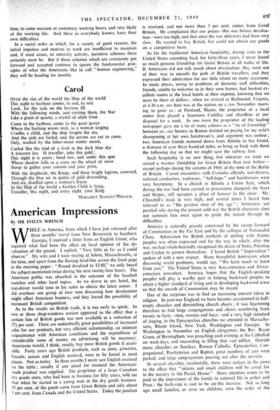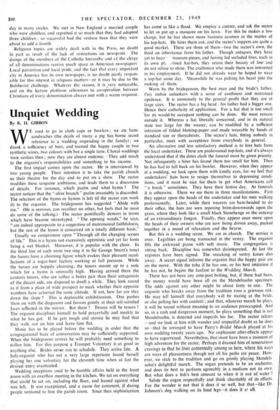American Impressions
By SIR EVELYN WRENCH
WHILE in America, from which I have just returned after three months' travel from New Brunswick to Southern Georgia, I received a letter from an English friend, who inquired what had been the effect on local opinion of the de-
valuation of the pound. I replied, " Very little as far as I could observe." My wife and I were staying at Salem, Massachusetts, at the time, and apart from the flaming head-line across the front page in the morning paper: " Pound devalued to S2.130," we only heard the subject mentioned twice during the next twenty-four hours. The American public was absorbed in the outcome of the baseball matches and other local topics. As we drove to our hotel, the taxi-driver would tune in his radio to obtain the latest scores. I did overhear one group of four men discussing how devaluation might affect American business, and they feared the possibility of increased British competition.
As to the results on British trade, it is too early to speak. In two or three shop-windows notices appeared to the effect that a certain line of British goods was now available at a reduction of 37+ per cent. There are undoubtedly great possibilities of increased sales for our products, but very efficient salesmanship, an intimate acquaintance with American conditions and the expenditure of considerable sums of money on advertising will be necessary. Americans would, I think, readily buy more British goods if acces- sible. Forty years ago British products, such as jams, groceries, biscuits, sauces and English mustard, were to be found in most places. Not so today. In three months I never saw English mustard on the table ; usually if one asked for mustard the American- made product was,supplied. The proprietor of a large Canadian dry goods store, who had been in business for fifty years, told me that when he started as a young man in the dry goods business 95 per cent. of the goods came from Great Britain and only about 5 per cent. from Canada and the United States. Today the position
is reversed, and not more than 5 per cent. comes from Great Britain. He complained that our prices—this was before devalua- tion—were too high, and that since the war deliveries had been very slow. He wanted to buy British, but could not obtain our goods on a competitive basis.
As for the traditional American hospitality, during visits to the United States extending back for forty-three years, I never found so much genuine friendship for Great Britain in all walks of life. If Americans did not talk much about devaluation, they went out of their way to smooth the path of British travellers, and they expressed their admiration for our little island on many occasions. In many places, owing to problems of domestic staff difficulties, friends, unable to welcome us in their own homes, had booked ex- cellent rooms at the local hotels at their expense, knowing that we must be short of dollars ; when we arrived at Richmond, Virginia, at 6.30 a.m. our host was at the station on a raw November morn- ing to greet us; at Portland, Maine, the proprietor of a local motor firm placed a luxurious Cadillac and chauffeur at our disposal for a week. In one town the proprietor of the leading newspaper gave me a tie of many colours as a " tie of friendship - between us ; our hostess in Boston insisted on paying for my wife's shampooing at her own hairdresser's, and argument was useless ; two American friends motored down from Atlanta to Sea Island, a distance of over three hundred miles, to bring us back with them the following day so that we might save the railway fare.
Such hospitality is no new thing, but wherever we went we sensed a wanner friendship for Great Britain than ever before— except perhaps during the autumn of 1940, at the time of the Battle of Britain. Casual encounters with Customs officials, taxi-drivers, railroad conductors, waitresses, " bell-hops " and hairdressers were very heartening. In a church in Atlanta a Union Jack, which during the war had been carried in processions alongside the Stars and Stripes, still occupies a place of honour in the choir. Mr., Churchill's stock is very high, and several times I heard him referred to as " the greatest man of the age " ; Americans are puzzled why during the present cold war the British electorate does not summon him once again to guide the nation through its difficulties.
America is naturally gravely concerned by the sweep forward of Communism in the Far East and by the collapse of Nationalist China. Admiration for British methods of dealing with Asiatic peoples was often expressed and for the way in which, after the war, we had whole-heartedly recognised the desire of India, Pakistan and Ceylon to govern themselves. I heard British " Imperialism " spoken of with a new respect. Many thoughtful Americans, when discussing world problems, would say, " We have much to learn from you." The United States is very Asia-conscious and Africa- conscious nowadays. America hopes that the English-speaking peoples will play a worthy part in helping backward peoples to attain a higher standard of living and in developing backward areas so that the onrush of Communism may be stayed.
One of the surprises was to find an increasing interest taken in religion. In post-war England we have become accustomed to half- empty churches and diminishing church choirs ; it was heartening therefore to find large congregations and choirs numbering from twenty to forty—men, women and boys—and a very high standard of singing, in the Episcopalian churches we attended in Massachu- setts, Rhode Island, New York, Washington and Georgia. In Washington in November an English clergyman, the Rev. Bryan Green, of Birmingham, was preaching each evening at the Cathedral on week-days, and succeeding in filling that vast edifice. Outside' many churches on Sundays, Roman Catholic, Episcopalian, Con- gregational, gregational, Presbyterian and Baptist, great numbers of cars were parked, and large congregations pouring out after the services.
In several churches, incidentally, there were notices in the pews. to the effect that "infants and small children will be cared for in the nursery in the Parish House." More attention seems to be paid to the importance of the family in national life in pulpit and Press ; the birth-rate is said to be on/the increase. Not so long ago small families, or even no children, were the order of the day in many circles. We met in New England a married couple who were childless, and regretted it so much that they had adopted three children ; so successful had the venture been that they were about to add a fourth
Religious topics are widely dealt with in the Press, no doubt in part as result of the lack of restrictions on newsprint. The doings of the members of the Catholic hierarchy and Gf the clergy of all denominations receive much space in American newspapers Local patriotism and local pride, and the fact that every important city in America has its own newspaper, is no doubt partly respon- sible for this interest in religious matters—sir it may be due to the Bolshevist challenge. Whatever the reason, it is avery noticeable, and on the lecture platform references to co-operation between Christians of every denomination always met with a warm response.



































 Previous page
Previous page